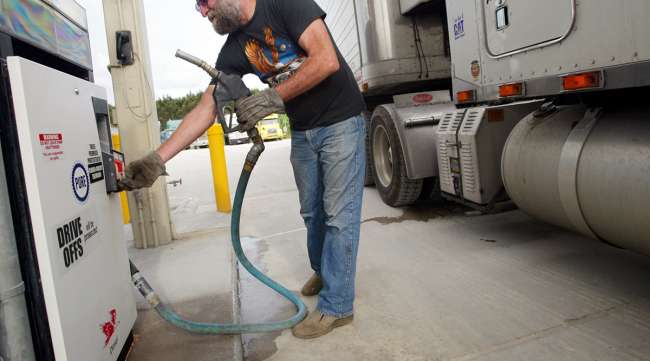Staff Reporter
Diesel Falls 8.1¢ to $2.733 a Gallon; Gasoline Drops 12.7¢

[Stay on top of transportation news: Get TTNews in your inbox.]
The nationwide average price of diesel fuel declined by 8 cents per gallon March 16, according to the U.S. Energy Information Administration.
EIA reported that the price of diesel decreased 8.1 cents to $2.733 a gallon from $2.814 the previous week. Diesel now costs 33.7 cents a gallon less than it did a year ago.
The price fell in every region. The Midwest saw the biggest decrease at 9.8 cents to $2.591. The Central Atlantic region saw the smallest drop for the week, 5.6 cents to $2.989. The entirety of the East Coast saw a decline of 7.1 cents to $2.789.
U.S. average on-highway #diesel fuel price on 3/16/2020 was $2.733/gal, DOWN 8.1¢/gallon from 3/09/2020, DOWN 33.7¢/gallon from year ago https://t.co/wow4uPI5WB #truckers #shippers #fuelprices pic.twitter.com/w3Y7ucEEdC — EIA (@EIAgov) March 17, 2020
California, which typically has seen price increases this year, saw diesel fall by 8 cents. Still, the Golden State has the most expensive diesel at $3.625 a gallon.
The price of regular unleaded gasoline plummeted by 12.7 cents to $2.248 a gallon. Prices fell in all regions, with the most significant change in the Midwest, where it declined 19.6 cents to $2.037. Gasoline now costs 3 cents per gallon less than it did a year ago.
“The good news is prices might be headed for a historic low,” Phil Flynn, a senior energy analyst at The Price Futures Group, told Transport Topics. “That’s the good news. The bad news is they are going down because the economy is tanking. We might see, when adjusted for inflation, the lowest prices in history, but it doesn’t matter if you aren’t going anywhere and that’s part of the problem.”
Flynn added that he is optimistic the economy will roar back in a couple of months, but that doesn’t help businesses that are being negatively impacted in the short term.
“Right now, oil producers are losing money, refiners are losing money,” Flynn said. “It’s not good times. So through these crises, the silver lining, these low prices should help boost the economy on the back end. Definitely for truck drivers, it’s going to be great so long as they’re moving goods.”
The coronavirus outbreak has had a profound impact on the global economy, including fuel prices. It has caused whole regions to shut down and disruptions of supply chains that have affected demand for fuel.
“We’re hauling plenty of freight, we just don’t know what the near-term future holds. But so far, so good,” Melton Truck Lines Inc. Chief Financial Officer Robert Ragan told TT. “It’s certainly something we have never ever dealt with. I was in the same position during the Great Recession, and that was for a lack of a better term spooky for a period of time.”
U.S. average price for regular-grade #gasoline on 3/16/2020 was $2.248/gal, DOWN 12.7¢/gallon from 3/09/2020, DOWN 30.0¢/gallon from year ago https://t.co/a5H3wKFCZ9 #gasprices pic.twitter.com/COlQtnDMZe — EIA (@EIAgov) March 17, 2020
Ragan added that the situation is uncharted waters for the country and for managing business. Companies have to figure out how much they have in reserve and hope it’s enough to make it through this uncertain time.
“What’s happening is, this drop in fuel primarily is saving shippers a fair amount of money on their transportation spend,” Ragan said. “Especially with the larger shippers, they all have fuel surcharges with us.”
Ragan added that when fuel prices rise, some of those costs are passed on to the shippers they work with. When prices fall, they save money — like what is happening now. But despite these savings, he still is concerned about what this means for the economy and how that could impact businesses like his.
“My personal opinion on a macro level is this isn’t good for the overall economy when prices fall this far,” Ragan said. “Prices are falling, our surcharges are dropping, shippers are saving money, but it’s just not an overall good thing for the U.S. to see it fall like this.”
Ragan said his company doesn’t haul a lot of fuel but noted concern for those companies that do. He also expressed that the fall in fuel prices is not good for his region of the country, Tulsa, Okla., which employs a lot of people in the oil sector.
Melton Truck Lines ranks No. 85 on the Transport Topics Top 100 list of the largest for-hire carriers in North America.
Want more news? Listen to today's daily briefing:




